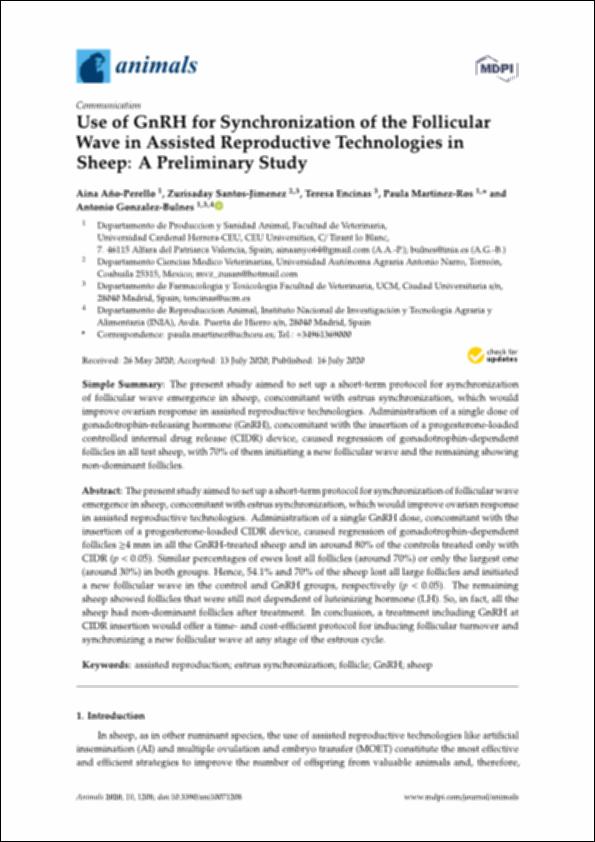Por favor, use este identificador para citar o enlazar este ítem:
http://hdl.handle.net/10637/12502Use of GnRH for synchronization of the follicular wave in assisted reproductive technologies in sheep : a preliminary study
| Título : | Use of GnRH for synchronization of the follicular wave in assisted reproductive technologies in sheep : a preliminary study |
| Autor : | Añó Perelló, Aina Santos Jiménez, Zurisaday Encinas Cerezo, Teresa Martínez Ros, Paula González de Bulnes López, Antonio |
| Materias: | Estro.; Estrus.; Sheep - Generative organs.; Ovejas - Reproducción asistida.; Sheep - Reproductive technology.; Reproducción asistida en los animales.; Hormonas sexuales.; Hormones, Sex.; Ovejas - Aparato genital.; Reproductive technologie in animals. |
| Editorial : | MDPI |
| Citación : | Año-Perello, A., Santos-Jimenez, Z., Encinas, T., Martinez-Ros, P., Gonzalez-Bulnes, A. (2020). Use of GnRH for synchronization of the follicular wave in assisted reproductive technologies in sheep: a preliminary study. Animals, vol. 10, i. 7 (16 jul.), art. 1208. DOI: https://doi.org/10.3390/ani10071208 |
| Resumen : | The present study aimed to set up a short-term protocol for synchronization of follicular wave emergence in sheep, concomitant with estrus synchronization, which would improve ovarian response in assisted reproductive technologies. Administration of a single GnRH dose, concomitant with the insertion of a progesterone-loaded CIDR device, caused regression of gonadotrophin-dependent follicles 4 mm in all the GnRH-treated sheep and in around 80% of the controls treated only with CIDR (p < 0.05). Similar percentages of ewes lost all follicles (around 70%) or only the largest one (around 30%) in both groups. Hence, 54.1% and 70% of the sheep lost all large follicles and initiated a new follicular wave in the control and GnRH groups, respectively (p < 0.05). The remaining sheep showed follicles that were still not dependent of luteinizing hormone (LH). So, in fact, all the sheep had non-dominant follicles after treatment. In conclusion, a treatment including GnRH at CIDR insertion would o er a time- and cost-e cient protocol for inducing follicular turnover and synchronizing a new follicular wave at any stage of the estrous cycle. |
| Descripción : | Este artículo se encuentra disponible en la siguiente URL: https://www.mdpi.com/2076-2615/10/7/1208 Este artículo pertenece al número especial "New technologies in ruminant breeding". |
| URI : | http://hdl.handle.net/10637/12502 |
| Derechos: | http://creativecommons.org/licenses/by/4.0/deed.es |
| ISSN : | 2076-2615 (Electrónico). |
| Fecha de publicación : | 16-jul-2020 |
| Centro : | Universidad Cardenal Herrera-CEU |
| Aparece en las colecciones: | Dpto. Producción y Sanidad Animal, Salud Pública Veterinaria y Ciencia y Tecnología de los Alimentos |
Los ítems de DSpace están protegidos por copyright, con todos los derechos reservados, a menos que se indique lo contrario.


